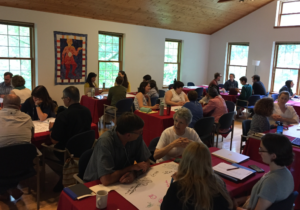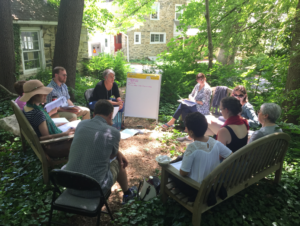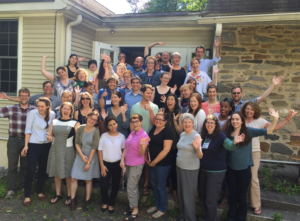Like most folks involved in sustainability work in higher ed, my tasks are diverse and plentiful. At times, and especially at the end of the academic year, my roles as faculty member and sustainability champion can leave me (perhaps I’m not alone here?) feeling a bit burned out.
So, despite the fact that I eagerly registered for AASHE’s Sustainability Professionals Retreat as soon as I’d heard about it, as the time neared I found myself wearily wondering, “why did I sign up for this?” I wanted nothing more than to stay home, catch my breath, and try to relocate my motivation. Thankfully, years of experience have taught me a thing or two about these kinds of cycles, and I knew that once I got myself there, I’d be glad I went.
What I didn’t know was that this would turn out to be one of the best professional development experiences I’ve ever had.
Having taught countless classes and facilitated a handful of workshops, I know that events like this can be somewhat unpredictable, depending as they do on the dynamics of participating personalities. It was clear, however, that these facilitators knew what they were doing. They seemed to have thought of everything to ensure success, whatever the group’s chemistry happened to be (which, incidentally, turned out to be wonderful!).
Transparency with regard to the purposes, outcomes and processes related to each activity kept us oriented and clear about what we were doing, why, and how. The cases and examples they (and their presenters) used helped to illustrate key ideas and bring their points to life. They struck just the right balance of content and dynamic interaction, professional and personal networking, and business, downtime, and downright fun. In the process, they modeled everything they wanted us to take back to our respective institutions, providing live examples of select strategies at work, allowing us to witness the potential pitfalls and possibilities associated with each.
In keeping with their example of intentionality, for instance, one of the first things they had us do was to state our intentions—in writing. We then gave the paper to a partner for safekeeping until the end of the retreat, when they were to return it to us. Here’s what I wrote down that first day:
Why am I here?
I’m hoping to be (re)inspired and motivated to be able to devote lots of energy and enthusiasm to campus sustainability AND to learn a ton about best practices in communication, engagement, planning, and implementation.
What do I hope to get out of it?
The skills and confidence to inspire, motivate, and lead others on my campus.
How will I ensure the best possible experience?
I will remember the above, remain open to others’ experience and wisdom, and be ready to share generously.
Whether it was the facilitators’ skills or the fact that I set those intentions, or both, I got all that…and then some. I can’t do justice to it all in this brief post, but I’ll try to capture some of the highlights.
Monday
 On Monday, after being reminded why we were there and why we do the work we do, we participated in a lively “WTF World Café.” Based on the premise that conversation is what drives organizational life, this activity had rotating small groups discussing how the world situation is affecting our campuses and our work, and what enables us to respond effectively. We were then treated to some mind-blowing insights into the secret life of the ideas that proliferate in service to the goal of sustainability. Underlying the straight line of the official narrative, Leith Sharp revealed, is the complicated squiggle of an idea’s actual path in most organizations. We learned about the tensions between “operating systems”—the one in charge of maintaining order and ensuring survival and the one inclined toward new ideas. (I heard gasps of surprised recognition as participants, myself included, got newfound clarity about their own institutions.) Finally, we discussed how to better understand the failure, and ensure the success, of a given idea and how mapping those can provide crucial insights for better aligning these equally important operating systems.
On Monday, after being reminded why we were there and why we do the work we do, we participated in a lively “WTF World Café.” Based on the premise that conversation is what drives organizational life, this activity had rotating small groups discussing how the world situation is affecting our campuses and our work, and what enables us to respond effectively. We were then treated to some mind-blowing insights into the secret life of the ideas that proliferate in service to the goal of sustainability. Underlying the straight line of the official narrative, Leith Sharp revealed, is the complicated squiggle of an idea’s actual path in most organizations. We learned about the tensions between “operating systems”—the one in charge of maintaining order and ensuring survival and the one inclined toward new ideas. (I heard gasps of surprised recognition as participants, myself included, got newfound clarity about their own institutions.) Finally, we discussed how to better understand the failure, and ensure the success, of a given idea and how mapping those can provide crucial insights for better aligning these equally important operating systems.
Tuesday
 We heard from some sustainability professionals who work with colleges and universities on the reporting and planning, purchasing, and energy sides of things. We engaged in appreciative inquiry about our values and the experiences most significant to us. We each selected two, from several possible, workshops on a range of topics (from mindfulness, student engagement, storytelling, carbon pricing, and more). Finally, we were introduced to the “learning lab” process and our partners, for whom we would harvest key information and ideas from one of four “advanced track” sessions and with whom we would collaborate to distill and share our individual and collective takeaways with the whole group. The best part was the requirement that we do it in six minutes or less and in the most entertaining way possible. These priorities, entertainment and creativity, pervaded the whole retreat, but were on special display after dinner this night!
We heard from some sustainability professionals who work with colleges and universities on the reporting and planning, purchasing, and energy sides of things. We engaged in appreciative inquiry about our values and the experiences most significant to us. We each selected two, from several possible, workshops on a range of topics (from mindfulness, student engagement, storytelling, carbon pricing, and more). Finally, we were introduced to the “learning lab” process and our partners, for whom we would harvest key information and ideas from one of four “advanced track” sessions and with whom we would collaborate to distill and share our individual and collective takeaways with the whole group. The best part was the requirement that we do it in six minutes or less and in the most entertaining way possible. These priorities, entertainment and creativity, pervaded the whole retreat, but were on special display after dinner this night!
Wednesday
After spending some time learning more about our partners’ roles and interests on Wednesday, we each headed off to one of the four advanced tracks, including: strategic alignment, process design/meeting facilitation, organizational flow, and emotional intelligence. Team members then shared highlights with each other and began planning their final presentations. Humor, creativity, and talent abounded in the groups’ work and later in the evening’s entertainment, featuring the eclectic comedy and thoughtful social commentary of Peterson Toscano.
Thursday
 Thursday morning brought more team work time and culminated in THE most poignant and hilarious sustainability presentations I’ve ever seen! All were rapt as superheroes, musicians, acting talents, soulful rappers, and movie makers, in turn, took the stage to share the best of what they learned.
Thursday morning brought more team work time and culminated in THE most poignant and hilarious sustainability presentations I’ve ever seen! All were rapt as superheroes, musicians, acting talents, soulful rappers, and movie makers, in turn, took the stage to share the best of what they learned.
Given the diversity of participants’ roles and interests, I can only imagine the many and varied uses to which all this information and inspiration will be put. For my part, I’m working to apply what I learned at the Sustainability Professionals Retreat in my current efforts to:
- align sustainability with strategic institutional goals
- collaborate with the Residential Education office to infuse sustainability into RA training and life in the residence halls
- help build stronger relationships with and among key offices on campus
- develop a common vision of and language for sustainability as a value that permeates the College
- engage in forward flow mapping to facilitate the success of these and other plans (and, if I have time, to do some forensic analysis of past ideas)
This holistic retreat covered more than I could have reasonably expected. From poetry to purchasing. Energy to emotional intelligence. Carbon pricing to comedy. Strategic planning to social capital. Organizational transformation to open mic extravaganza.
Let’s face it, this work is as challenging as it is necessary.
If we are to sustain our ability to continue it, we occasionally need the re-invigoration that comes from being together and sharing our experiences, energy, and support with one another. This retreat provided all that, and a network of creative, smart, funny, and all around cool sustainability warriors I now call friends. Here’s to great success in all of our efforts!